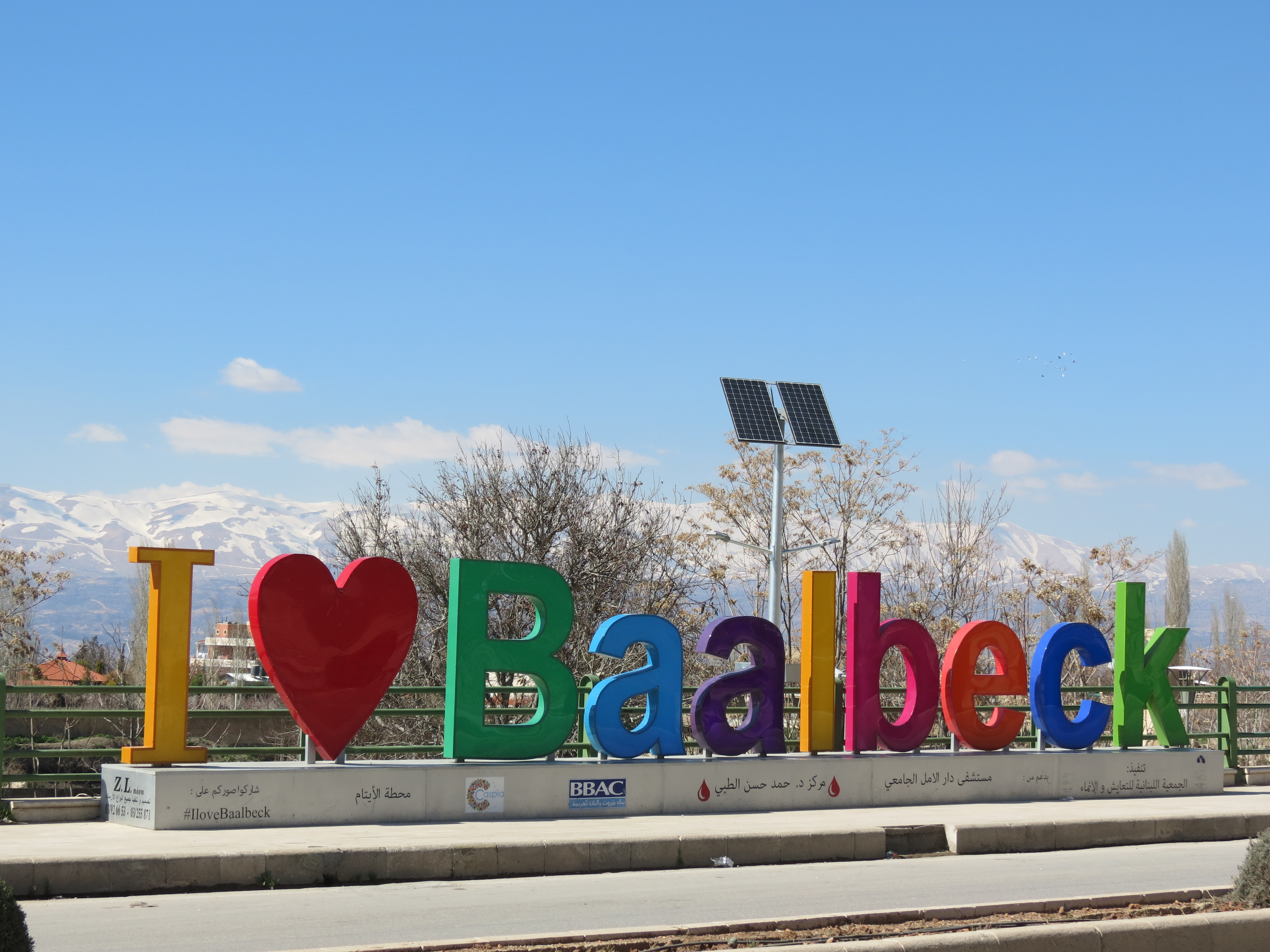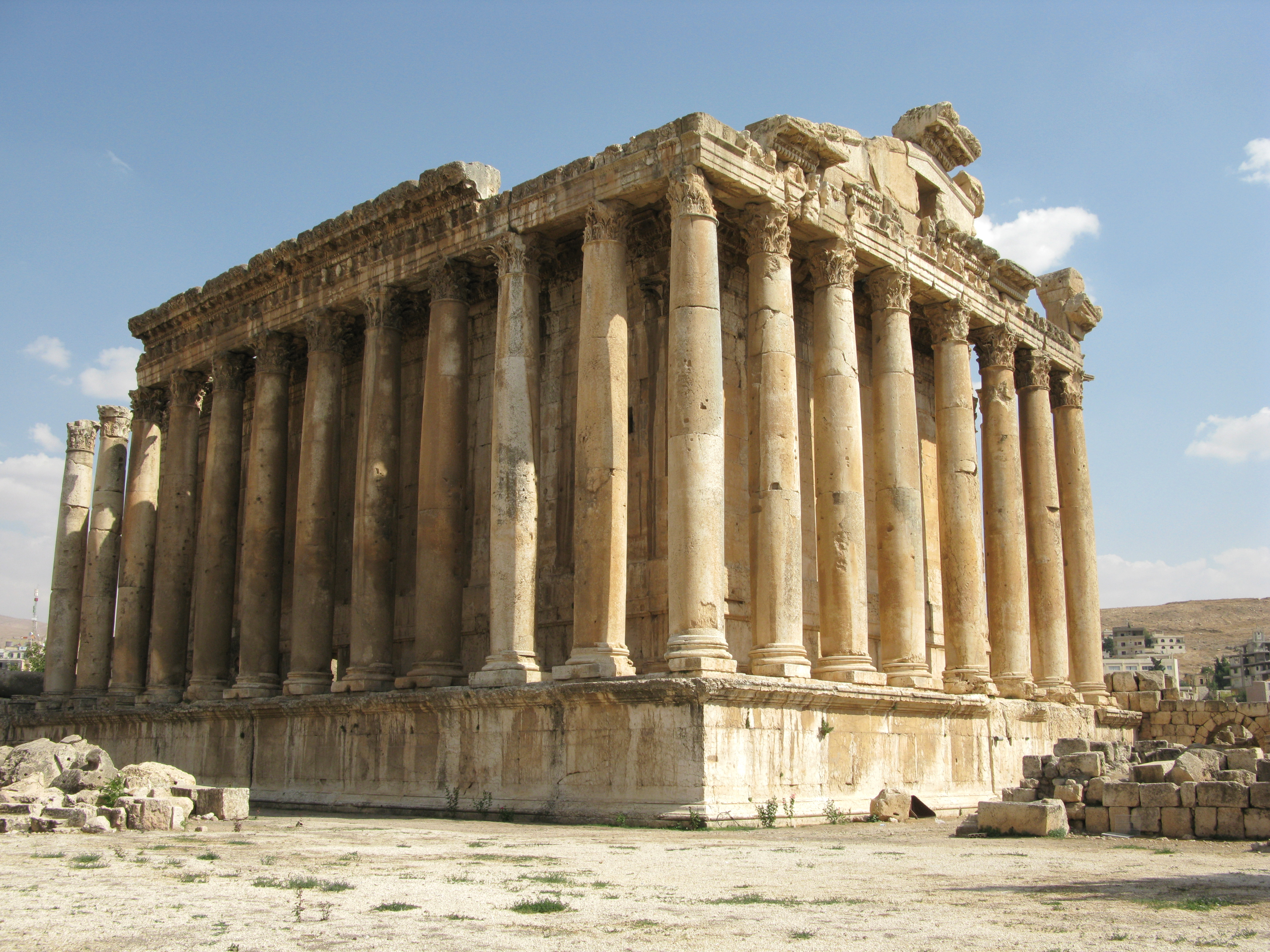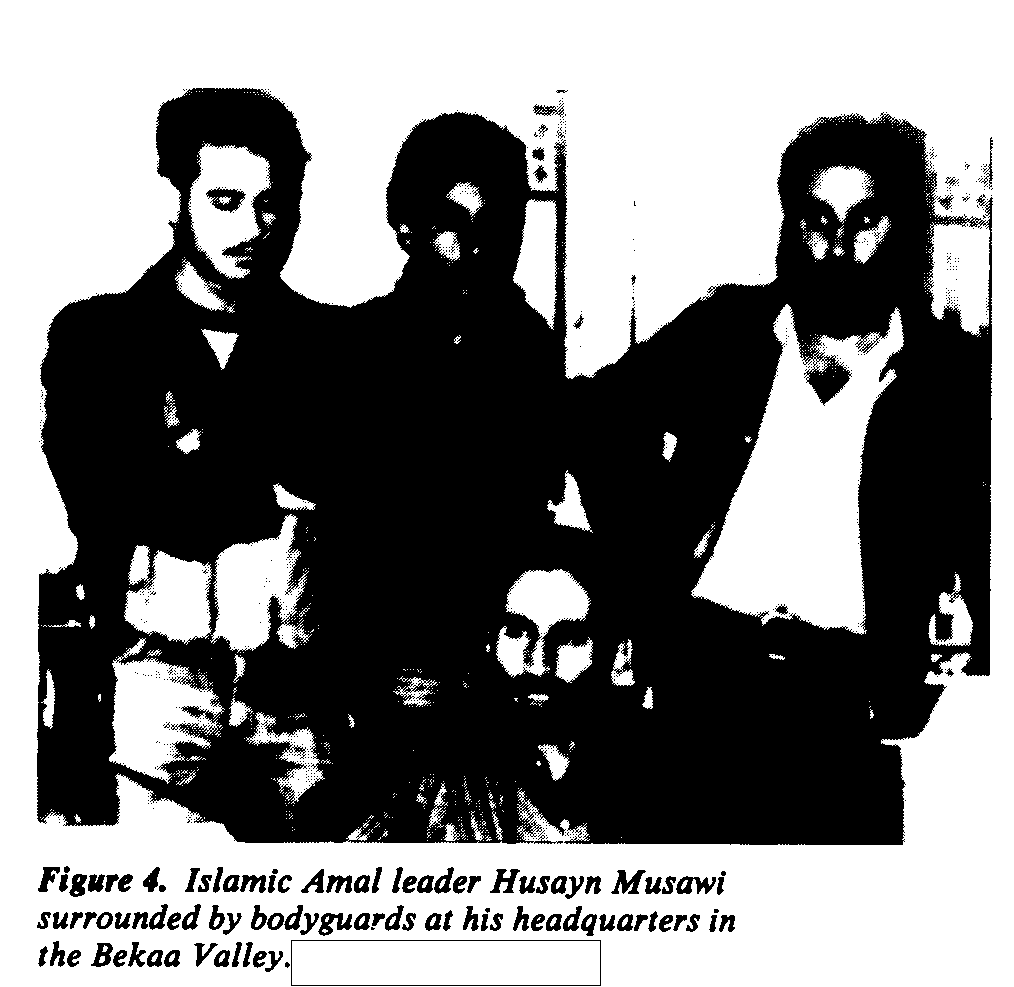|
Islamic Amal
Islamic Amal (in Arabic أمل الإسلامية) was a Lebanese Shia military movement based in Baalbek in the Beqaa Valley, Islamic Amal was led by Husayn Al-Musawi, who was also a leading figure in Hezbollah. The movement got its start in June 1982 when Nabih Berri, the head of Amal, agreed to participate in the Salvation Committee, a body set up by President Elias Sarkis following the Israeli invasion. The committee included Bachir Gemayel, the Maronite commander of the Lebanese Forces. Musawi considered Berri's actions "treasonous" and Amal's orientation too secular. In response, Musawi broke from Amal and set up his own faction, which observers believed was organized primarily along family lines. Islamic Amal was backed by officials in the Iranian government, and it coordinated with units of Iran's (Pasdaran) Revolutionary Guards The Islamic Revolutionary Guard Corps (IRGC; fa, سپاه پاسداران انقلاب اسلامی, Sepāh-e Pāsdārān-e Enghelāb-e E ... [...More Info...] [...Related Items...] OR: [Wikipedia] [Google] [Baidu] |
Arabic Language
Arabic (, ' ; , ' or ) is a Semitic language spoken primarily across the Arab world.Semitic languages: an international handbook / edited by Stefan Weninger; in collaboration with Geoffrey Khan, Michael P. Streck, Janet C. E.Watson; Walter de Gruyter GmbH & Co. KG, Berlin/Boston, 2011. Having emerged in the 1st century, it is named after the Arab people; the term "Arab" was initially used to describe those living in the Arabian Peninsula, as perceived by geographers from ancient Greece. Since the 7th century, Arabic has been characterized by diglossia, with an opposition between a standard prestige language—i.e., Literary Arabic: Modern Standard Arabic (MSA) or Classical Arabic—and diverse vernacular varieties, which serve as mother tongues. Colloquial dialects vary significantly from MSA, impeding mutual intelligibility. MSA is only acquired through formal education and is not spoken natively. It is the language of literature, official documents, and formal written m ... [...More Info...] [...Related Items...] OR: [Wikipedia] [Google] [Baidu] |
Baalbek
Baalbek (; ar, بَعْلَبَكّ, Baʿlabakk, Syriac-Aramaic: ܒܥܠܒܟ) is a city located east of the Litani River in Lebanon's Beqaa Valley, about northeast of Beirut. It is the capital of Baalbek-Hermel Governorate. In Greek and Roman times Baalbek was also known as Heliopolis (, Greek for "Sun City"). In 1998 Baalbek had a population of 82,608, mostly Shia Muslims, followed by Sunni Muslims and Christians. It is home to the Baalbek temple complex which includes two of the largest and grandest Roman temple ruins: the Temple of Bacchus and the Temple of Jupiter. It was inscribed in 1984 as an UNESCO World Heritage site. Name A few miles from the swamp from which the Litani (the classical Leontes) and the Asi (the upper Orontes) flow, Baalbek may be the same as the ''manbaa al-nahrayn'' ("Source of the Two Rivers"), the abode of El in the Ugaritic Baal Cycle discovered in the 1920s and a separate serpent incantation. Baalbek was called Heliopolis during the Roma ... [...More Info...] [...Related Items...] OR: [Wikipedia] [Google] [Baidu] |
Beqaa Valley
The Beqaa Valley ( ar, links=no, وادي البقاع, ', Lebanese ), also transliterated as Bekaa, Biqâ, and Becaa and known in classical antiquity as Coele-Syria, is a fertile valley in eastern Lebanon. It is Lebanon's most important farming region. Industry also flourishes in Beqaa, especially that related to agriculture. The Beqaa is located about east of Beirut. The valley is situated between Mount Lebanon to the west and the Anti-Lebanon Mountains to the east. It forms the northeasternmost extension of the Great Rift Valley, which stretches from Syria to the Red Sea. Beqaa Valley is long and wide on average. It has a Mediterranean climate of wet, often snowy winters and dry, warm summers. The region receives limited rainfall, particularly in the north, because Mount Lebanon creates a rain shadow that blocks precipitation coming from the sea. The northern section has an average annual rainfall of , compared to in the central valley. Nevertheless, two rivers ... [...More Info...] [...Related Items...] OR: [Wikipedia] [Google] [Baidu] |
Husayn Al-Musawi
Husayn Al-Musawi (also Hussein Musawi) is a Lebanese who founded the now-dissolved pro-Iranian Islamist militia Islamic Amal in 1982. He was a Shia from Baalbek. Musawi was a "chemistry teacher turned militia commander" who became the deputy head and official spokesman of the Amal movement/party/militia, Lebanon's largest Shi'ite movement. On June 21, 1982, he defected from Amal to start the Islamic Amal splinter group, operating out of Baalbek, Lebanon. Musawi disapproved of Amal leader Nabih Berri's participation in the first session of the six-man Lebanese National Salvation Committee, his acceptance of "U.S. diplomatic efforts to end the Israeli siege of West Beirut, which was also Amal's strong hold," and his opposition to the pledging of pan-Islamic allegiance by Amal to Iranian Revolutionary Islamist leader Ayatollah Khomeini. Under his leadership, Islamic Amal captured the Lebanese Gendarmerie barracks in Baalbeck on November 21, 1982. The barracks were later use ... [...More Info...] [...Related Items...] OR: [Wikipedia] [Google] [Baidu] |
Nabih Berri
Nabih Berri ( ar, نبيه مصطفى بري, translit=Nabīh Muṣṭafā Barriyy, links=hh; born 28 January 1938) is a Lebanese Shia politician who has been serving as Speaker of the Parliament of Lebanon since 1992. He heads the Amal Movement. Early life and education He was born in Bo, Sierra Leone to Lebanese people, Lebanese Shia parents on 28 January 1938. His father, Mustafa Berri, was a trader there. Berri went to school in Tebnine and Ain Ebel in southern Lebanon, then continued his education in Bint Jbeil and Jaafariya supplementary schools in southern Lebanon and later studied at the Makassed and the Ecole de la Sagesse in Beirut. He graduated with a law degree from the Lebanese University in 1963, where he had served as the student body president, and became a lawyer at the Court of Appeals. Early career During 1963, Berri was elected as president of the National Union of Lebanese Students, and participated to student and political conferences. During his earl ... [...More Info...] [...Related Items...] OR: [Wikipedia] [Google] [Baidu] |
Elias Sarkis
Elias is the Greek equivalent of Elijah ( he, אֵלִיָּהוּ ''ʾĒlīyyāhū''; Syriac: ܐܠܝܐ ''Eliyā''; Arabic: الیاس Ilyās/Elyās), a prophet in the Northern Kingdom of Israel in the 9th century BC, mentioned in several holy books. Due to Elias' role in the scriptures and to many later associated traditions, the name is used as a personal name in numerous languages. Variants * Éilias Irish * Elia Italian, English * Elias Norwegian * Elías Icelandic * Éliás Hungarian * Elías Spanish * Eliáš, Elijáš Czech * Elias, Eelis, Eljas Finnish * Elias Danish, German, Swedish * Elias Portuguese * Elias, Iliya () Persian * Elias, Elis Swedish * Elias, Elyas Ethiopian * Elias, Elyas Philippines * Eliasz Polish * Élie French * Elija Slovene * Elijah English, Hebrew * Elis Welsh * Elisedd Welsh * Eliya (එලියා) Sinhala * Eliyas (Ілияс) Kazakh * Eliyahu, Eliya (אֵלִיָּהוּ, אליה) Biblical Hebrew, Hebrew * Elyās, Ilyās, Eliya (, ) ... [...More Info...] [...Related Items...] OR: [Wikipedia] [Google] [Baidu] |
Bachir Gemayel
Bachir Pierre Gemayel ( ; 10 November 1947 – 14 September 1982) was a Lebanese militia commander who led the Lebanese Forces, the military wing of the Kataeb Party in the Lebanese Civil War and was elected President of Lebanon in 1982. He founded and later became the supreme commander of the Lebanese Forces, uniting major Christian militias by force under the slogan of "Uniting the Christian Rifle". Gemayel allied with Israel and his forces fought the Palestine Liberation Organization and the Syrian Army. He was elected president on 23 August 1982, but he was assassinated before taking office on 14 September, via a bomb explosion by Habib Shartouni, a member of the Syrian Social Nationalist Party. Gemayel is described as the most controversial figure in the history of Lebanon. He remains popular among Maronite Christians, where he is seen as a "martyr" and an "icon". Conversely, he has been criticized for committing alleged war crimes and accused of treason for his ... [...More Info...] [...Related Items...] OR: [Wikipedia] [Google] [Baidu] |
Maronite
The Maronites ( ar, الموارنة; syr, ܡܖ̈ܘܢܝܐ) are a Christian ethnoreligious group native to the Eastern Mediterranean and Levant region of the Middle East, whose members traditionally belong to the Maronite Church, with the largest concentration long residing near Mount Lebanon in modern Lebanon. The Maronite Church is an Eastern Catholic particular church in full communion with the Pope and the rest of the Catholic Church, whose membership also includes non-ethnic Maronites. The Maronites derive their name from the Syriac Christian saint Maron, some of whose followers migrated to the area of Mount Lebanon from their previous place of residence around the area of Antioch, and established the nucleus of the Antiochene Syriac Maronite Church. Christianity in Lebanon has a long and continuous history. Biblical scriptures purport that Peter and Paul evangelized the Phoenicians, whom they affiliated to the ancient patriarchate of Antioch. The spread of Christianity ... [...More Info...] [...Related Items...] OR: [Wikipedia] [Google] [Baidu] |
Lebanese Forces
The Lebanese Forces ( ar, القوات اللبنانية '')'' is a Lebanese Christian-based political party and former militia during the Lebanese Civil War. It currently holds 19 of the 128 seats in Lebanon's parliament and is therefore the largest party in parliament. The organization was created in 1976 by Pierre and Bachir Gemayel, Camille Chamoun, and other party leaders during the Lebanese Civil War. It was initially an umbrella organization coordinating all the right-wing party militias of the Lebanese Front and served as the main resistance force of the front. The Kataeb Regulatory Forces provided the largest share of fighters, and the Kataeb Party had the largest share on the council. Despite its original creation from party militias, the Lebanese Forces accepted new recruits without any specific party allegiance. During the civil war, the Lebanese Forces fought different opponents at different times: the Palestinian Liberation Organization, the Lebanese National M ... [...More Info...] [...Related Items...] OR: [Wikipedia] [Google] [Baidu] |
Revolutionary Guards
The Islamic Revolutionary Guard Corps (IRGC; fa, سپاه پاسداران انقلاب اسلامی, Sepāh-e Pāsdārān-e Enghelāb-e Eslāmi, lit=Army of Guardians of the Islamic Revolution also Sepāh or Pasdaran for short) is a branch of the Iranian Armed Forces, founded after the Iranian Revolution on 22 April 1979 by order of Ayatollah Ruhollah Khomeini.IISS Military Balance 2006, Routledge for the IISS, London, 2006, p. 187 Whereas the Iranian Army defends Iranian borders and maintains internal order, according to the Iranian constitution, the Revolutionary Guard is intended to protect the country's Islamic republic political system, which supporters believe includes preventing foreign interference and coups by the military or "deviant movements". The IRGC is designated as a terrorist organization by the governments of Bahrain, Saudi Arabia and the United States. As of 2011, the Revolutionary Guards had at least 250,000 military personnel including ground, aerospace ... [...More Info...] [...Related Items...] OR: [Wikipedia] [Google] [Baidu] |
Arab Militant Groups
The Arabs (singular: Arab; singular ar, عَرَبِيٌّ, DIN 31635: , , plural ar, عَرَب, DIN 31635: , Arabic pronunciation: ), also known as the Arab people, are an ethnic group mainly inhabiting the Arab world in Western Asia, North Africa, the Horn of Africa, and the western Indian Ocean islands (including the Comoros). An Arab diaspora is also present around the world in significant numbers, most notably in the Americas, Western Europe, Turkey, Indonesia, and Iran. In modern usage, the term "Arab" tends to refer to those who both carry that ethnic identity and speak Arabic as their native language. This contrasts with the narrower traditional definition, which refers to the descendants of the tribes of Arabia. The religion of Islam was developed in Arabia, and Classical Arabic serves as the language of Islamic literature. 93 percent of Arabs are Muslims (the remainder consisted mostly of Arab Christians), while Arab Muslims are only 20 percent of the global Mus ... [...More Info...] [...Related Items...] OR: [Wikipedia] [Google] [Baidu] |








.jpg)